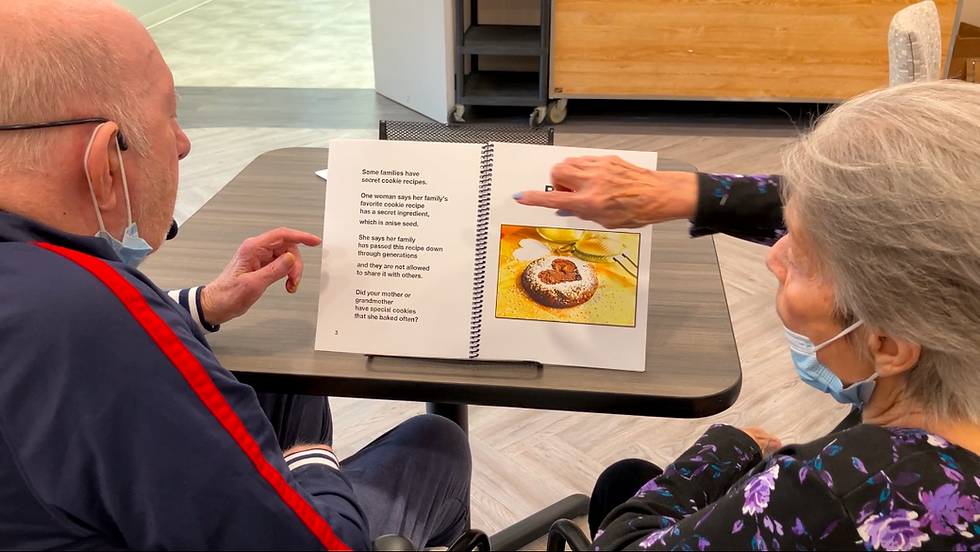9. How Reading Helps People Living with Dementia (Part 3)
- Susan Ostrowski, Co-Creator/Owner Reading2Connect®

- Oct 22, 2025
- 3 min read
This article — the third in our series — continues our exploration of the universal benefits of leisurely reading, this time emphasizing how those benefits can take on deeper meaning for individuals living with dementia. Beyond offering simple enjoyment, reading can become a lifeline to wellbeing and agency for those experiencing cognitive change.
In our earlier discussion, we described literature for people living with dementia as “text and images influencing thoughts and emotions.” Here, we take that a step further—recognizing reading for older adults as “text and images nurturing memory, communication, connection, and autonomy.”
Most Profound Benefits of Reading for People Living with Dementia
1) Human Connection

In our previous article, we discussed how accessible print can serve as both grounding and scaffolding for people living with dementia—helping them stay with a topic and move through a conversation. These are two abilities that often become challenging as dementia progresses. Readable words and meaningful images help ease cognitive strain and gently guide expression.
When most daily interactions center on surface topics—like meals, weather, or physical discomfort—there’s little space for genuine connection. A dementia-capable book (that is, one designed for adults and respectful of their life experience) can invite deeper, more personal dialogue: sharing experiences of a childhood sled ride, a kitchen mishap, or hard times during a drought.

Adapted print elicits language expression unique to each person. Opportunities for sharing reactions, opinions, and feelings arise naturally and unforced. This is authentic human connection.
Isolation is a threat to every dimension of well-being. In this light, amid cognitive change, accessible reading becomes not just an activity, but an essential bridge to belonging.
2) Contributing, Teaching, and Leading
Of all the gifts of reading explored in these three articles, this may be the most exciting: accessible print can transform a person’s role from receiver, responder, or listener into giver, initiator, and leader. Here’s how:

Reading Aloud to Peers
Across libraries, day centers, and long-term care settings, people living with dementia are helping others every day. With accessible reading materials, they are supporting their peers by reading aloud to those living with low vision or language limitations. These moments bring agency, purpose, and fun in shared experiences.
Facilitating Reading Groups with Peers
In some reading groups made up entirely of adults living with dementia—without a staff facilitator—something remarkable is happening. Each participant holds a copy of the same book, and together they spark conversations, pose questions, and steer the discussion themselves. What unfolds is not just a reading session, but an exchange of ideas, laughter, and insight—a community of peers discovering autonomy through prose.

Leading Activities
Equipped with readable materials and a simple voice amplifier, adults living with dementia are stepping into leadership roles—guiding their peers in activities like trivia, sing-alongs, jokes and riddles, or shared prayers. Some even lead routine gatherings such as morning sessions, announcing the date, weather, daily menu, or current events.
The enjoyment and pride that come from these moments of initiation and leadership remind us that the need for purpose and contribution doesn’t fade with memory—it remains an essential part of our humanity.
Volunteering in the Community
Accessible reading materials can also open doors beyond care settings. With readable print, people living with dementia are leading prayers and songs in congregations, guiding meditation groups at senior centers, reading aloud to children in schools or camps, or sharing accessible books about history and life with teenagers in crisis. Each act of reading and connection becomes an act of belonging and contribution. The possibilities created by accessible print are as limitless as the books themselves.

Living with Friendship and Purpose
Adapted print for people experiencing dementia flings open the doors to personal connection and community involvement.
Not long ago, senior care professionals believed we were serving people with dementia well by “keeping them busy” or entertaining them. Then we progressed to providing meaningful engagement. Now it’s time to move beyond engagement—to imagine lives with purpose: contributing, volunteering, leading, and teaching.
That is the extraordinary power of accessible reading for older adults. It transforms activity into agency, and participation into purpose—because well-being and self-worth grow through giving.
We'd love to hear from you!
Click below to comment, ask questions, or share your own reading experiences – the good and the bad.





















Comments